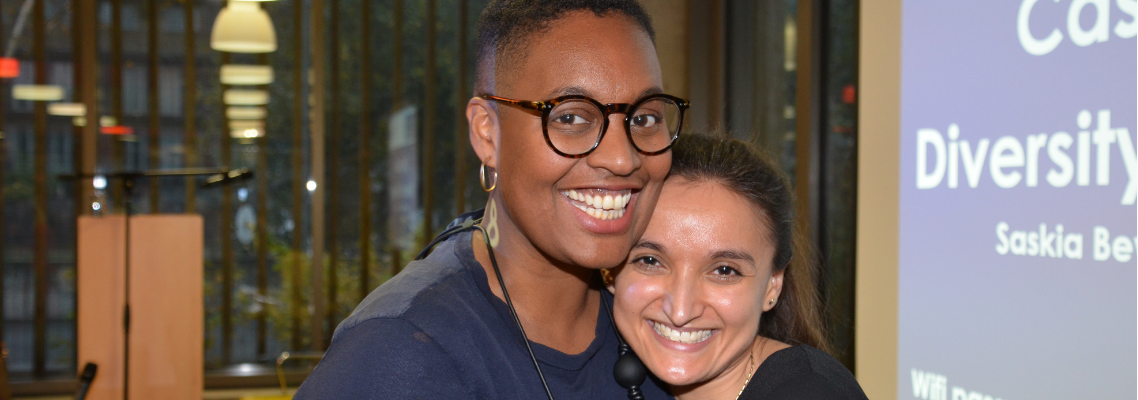Image: Sharmaine Lovegrove (L) and Saskia Bewley (R)
At The London Book Fair’s first conference on Building Inclusivity in the Publishing Industry in 2016, the then CEO of Hachette UK, Tim Hely Hutchinson, made a thoughtful speech in which he called for a kinder, more inclusive publishing industry—one in which everyone “regardless of our respective genders, sexuality, ethnic, religious, social or other backgrounds” felt at home.
Three years on and all the major houses have acted on diversity and inclusivity issues, with Hachette still one of the most prominent voices. At The LBF’s third Inclusivity conference held in London earlier this month, the presentation by Saskia Bewley, Hachette’s diversity and inclusion manager was impressive. She explained how Hachette has established eight employee networks, among them the Christian Employee Network and the Jewish Employee Network, with others covering sexuality, disability and gender issues.
“We’ve created safe spaces in which people can have all kinds of different conversations,” she said. “Do you know the stories of the people you work with? Don’t be afraid of disruptive inclusion. It’s in the process that we’re transformed.”
She added that there is a “moral case for diversity and inclusion, as well as a legal one and a business one”. The latter was a nod to the keynote by self-defined “working class queer woman” Kerry Hudson who reminded delegates that the potential disposable income of the BAME (black, Asian and minority ethnic) community is £300 billion, added to which is the £80 billion each for the ‘pink pound’—money spent by those of gay or lesbian sexual orientation—as well as by those with disabilities.
The thoughtfulness shown by Hely Hutchinson three years ago was continued by his successor David Shelley at the Bookseller’s Futurebook conference. In a reflective speech, he observed: “There has been a radical shift in the last 20 years or so and I think it is largely for the better. If I look back to 1997, what sort of an industry was that for someone who didn’t drink for cultural or religious or other reasons? How inclusive were we for people who weren’t ‘clubbable’, a term that was fairly common then and fortunately isn’t now. Although we of course have much further to go in terms of inclusivity, we have changed a lot already.”
Dialogue Books publisher Sharmaine Lovegrove – Futurebook’s Person of the Year – closed the conference with a plea that the industry ensures “inclusivity in the workplace is the norm and not just a trend”. She added: “It’s so hard to be this person and to be this black woman in this industry. It’s so hard to say ‘please make space for us’. I’m not going to say ‘please’ anymore. Next year we’re just going to do it.”
Such issues were discussed in a Publishers Weekly feature on ‘the next black publishing generation’. One BAME publisher said there were ongoing problems in marketing black-reader-focused titles. “The biggest challenge is trying to get a sales team that it is predominately straight white men and women to take a chance on unknown black authors. It constantly blows my mind how people don’t care about a book because they don’t fit into the narrative or don’t understand the context. It’s not until the New York Times—or any other big media outlet—makes a big deal of it that they go, ‘Wait, how can we capitalize on this?’ ”
And all the while the Big Bad Wolf continues to howl – and in some new places now. Sorry? The Big Bad Wolf is the catchy name for the enormous book fair established in Malaysia in 2009 by husband and wife team Andrew Yap and Jacqueline Ng, founders of Malaysian remainder retailer BooksXcess. This year it took its fair to Manila in the Philippines for the first time – where it opened 24 hours for two weeks – and it also made its debut in Dubai in October. At the start of December it was part of the International Children’s Content Rights Fair in Chiang Mai, Thailand and it will finish the year with another 24-hour fair at the Malaysia International Exhibition and Conference Centre south of Kuala Lumpur. Ng says she hopes to change the reading culture in Malaysia where reading to pass exams is placed above reading for pleasure.
Finally, congratulations to both BookBrunch and The London Book Fair for launching the Selfies, the first UK industry award for self-published authors. The winner will receive £1000 and almost certainly the attention of mainstream publishers – though of course, this may not necessarily be of interest to them: in this changed world there are those who are doing fine by self-publishing. What is certain though, is that an award for this sector is long overdue.

Roger Tagholm writes our Snapshot of the Week.

